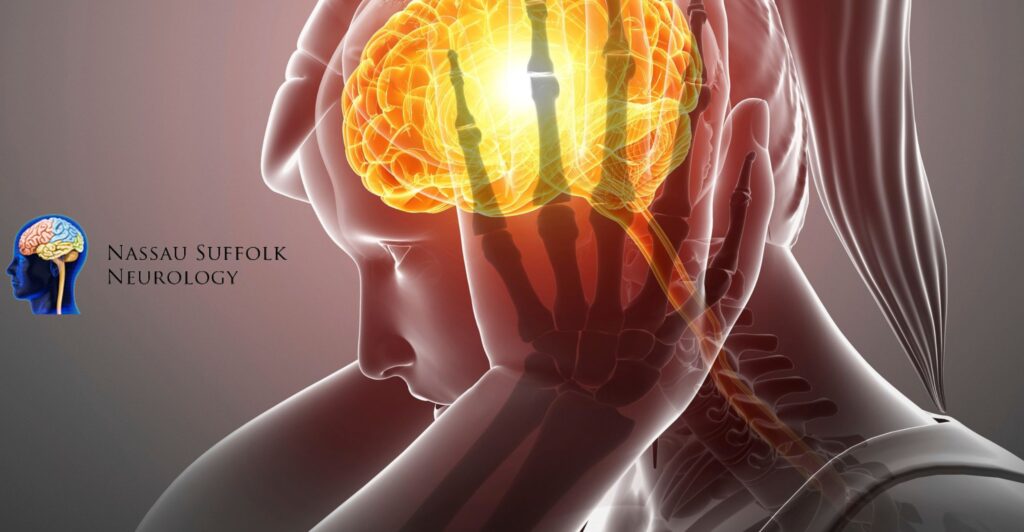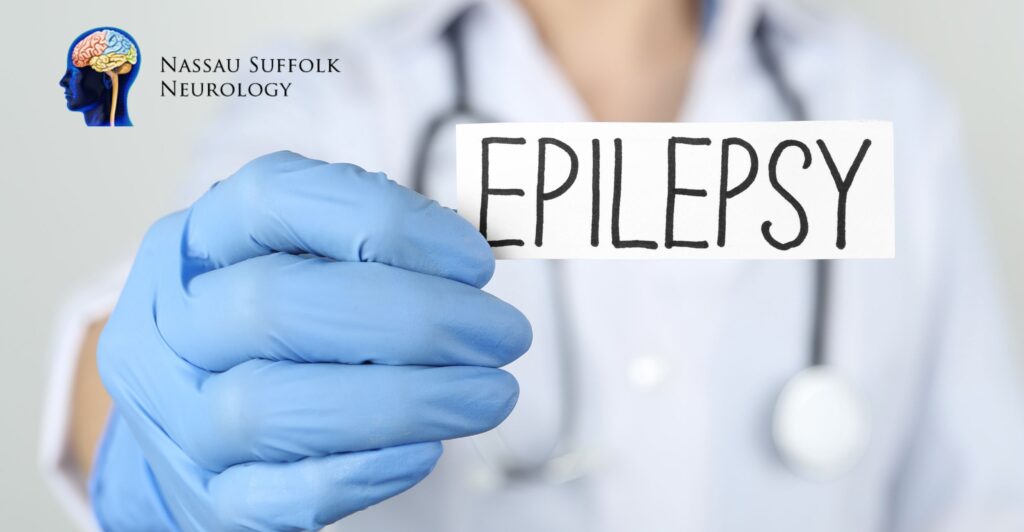Neurologist in Brentwood NY
Dr. Anthony Adamo graduated from Columbia University and the New York College of Osteopathic Medicine. He completed a rotating internship at St. Clare’s hospital in New York City and his neurology residency at the Nassau County Medical Center, where he was Chief Resident, and completed his Clinical Neurophysiology fellowship. Dr. Adamo is a Clinical Assistant Professor of Neurology at the SUNY-Stony Brook Medical School. He has authored several articles in professional journals. Dr. Adamo is certified by the American Board of Psychiatry and Neurology in the specialty of Neurology.
Office Location(s):
400 West Main Street
Suite 100
Babylon, New York 11702
Location Phone: 631-422-8822
Location Fax: 631-422-0798
My Phone: 631-422-8822
Fax: 631-422-0798
Mastering Epilepsy Management: Professional Tips from a Brentwood Neurologist
Epilepsy is a neurological disorder characterized by recurrent seizures that affects millions of people worldwide. Managing epilepsy requires a comprehensive approach that addresses various aspects of the condition, from diagnosis to treatment and lifestyle modifications. As a leading Brentwood neurologist, Nassau Suffolk Neurology is dedicated to providing expert guidance and support to individuals living with epilepsy. Here are professional tips for effectively managing epilepsy and improving quality of life. Visit our website today to learn more!
Understanding Epilepsy Management

Epilepsy management involves a multifaceted approach aimed at reducing seizure frequency, minimizing medication side effects, and enhancing overall well-being. It requires collaboration between Brentwood neurologists, patients, caregivers, and other healthcare professionals to develop tailored care plans that address individual needs and preferences.
Professional Tips for Epilepsy Management
1. Seek Early Diagnosis and Intervention
Early diagnosis is crucial for effective epilepsy management. As a Neurological specialist in Brentwood, NY, Nassau Suffolk Neurology emphasizes the importance of promptly seeking medical evaluation if experiencing symptoms such as seizures, loss of consciousness, or unusual sensations. Early intervention can lead to better seizure control and improved long-term outcomes.
2. Develop a Comprehensive Treatment Plan
A comprehensive treatment plan for epilepsy typically includes a combination of medications, lifestyle modifications, and, in some cases, surgical interventions. Working closely with a neurologist specializing in epilepsy management is essential for developing a personalized care plan tailored to individual needs. Nassau Suffolk Neurology offers expertise in selecting the most appropriate medications and monitoring their effectiveness while minimizing side effects.
3. Prioritize Medication Adherence
Consistent adherence to prescribed medications is essential for managing epilepsy effectively. Missing doses or discontinuing medicines without medical supervision can increase the risk of breakthrough seizures and complications. Bay Shore Neurologists at Nassau Suffolk Neurology provide education and support to help patients understand the importance of medication adherence and address any concerns or challenges they may encounter.
4. Monitor Seizure Activity
Regular monitoring of seizure activity is vital for assessing treatment effectiveness and making necessary adjustments to the care plan. Keeping a seizure diary or using mobile apps to track seizures, triggers, and medication adherence can provide valuable insights for both patients and healthcare providers. Nassau Suffolk Neurology offers comprehensive seizure monitoring and evaluation to optimize epilepsy management.
5. Embrace Lifestyle Modifications
In addition to medication management, lifestyle modifications can play a significant role in epilepsy management. Avoiding triggers such as sleep deprivation, stress, and alcohol consumption can help reduce the risk of seizures. Incorporating regular exercise, maintaining a healthy diet, and practicing stress-reduction techniques such as meditation or yoga can also contribute to overall well-being. A neurologist in Suffolk County at Nassau Suffolk Neurology collaborates with patients to develop lifestyle strategies that complement medical treatment and promote seizure control.
Benefits of Professional Epilepsy Management
Choosing a qualified Neurologist near Brentwood, NY, for epilepsy management offers several advantages:
- Access to specialized expertise in diagnosing and treating epilepsy.
- Comprehensive evaluation and personalized care plans tailored to individual needs.
- Regular monitoring of seizure activity and medication effectiveness.
- Education and support for medication adherence and lifestyle modifications.
- Coordinate care with other healthcare professionals, including neurosurgeons and psychologists, as needed.
Neurological Treatment in Brentwood
Living with epilepsy presents unique challenges, but with the proper support and guidance, individuals can effectively manage their condition and lead fulfilling lives. As a trusted Neurologist in Suffolk County, Nassau Suffolk Neurology is committed to providing expert care and empowering patients to take control of their epilepsy. By implementing these professional tips for epilepsy management, individuals can achieve better seizure control and improved quality of life.
If you or a loved one is living with epilepsy, don’t hesitate to reach out to Nassau Suffolk Neurology for compassionate and comprehensive care. Our team of experienced neurologists is here to support you every step of the way on your epilepsy management journey.
Debunking Common Myths About Epilepsy: Insights from Neurology Near Central Islip
Epilepsy is a neurological disorder surrounded by misconceptions and myths that can perpetuate stigma and misinformation. As a trusted Neurologist in Brentwood, NY, Nassau Suffolk Neurology aims to dispel these myths and provide accurate information about epilepsy. Let’s debunk some of the most common myths surrounding this condition.
Myth 1: Epilepsy is Rare
- Fact: Epilepsy is more common than you might think. It affects approximately 1 in 26 people at some point in their lives, making it one of the most prevalent neurological conditions globally.
Myth 2: Epilepsy is Always Genetic
- Fact: While genetics can play a role in some cases of epilepsy, many individuals develop the condition due to other factors, such as brain injuries, infections, or tumors. The cause of epilepsy is often unknown in about 6 out of 10 cases.

Myth 3: Seizures Are Always Violent and Obvious
- Fact: Seizures can manifest in various ways, and not all involve convulsions or loss of consciousness. Some seizures may cause brief staring spells, confusion, or subtle movements that can be easily missed or mistaken for other conditions.
Myth 4: Epilepsy is Contagious
- Fact: Epilepsy is not contagious. It is a neurological disorder caused by abnormal brain activity and cannot be transmitted from person to person through contact or exposure.
Myth 5: People with Epilepsy Are Mentally Disabled
- Fact: Epilepsy does not affect intelligence or mental capabilities. While some individuals with epilepsy may have comorbid conditions or cognitive challenges, many people with epilepsy lead regular, fulfilling lives and have successful careers and relationships.
Myth 6: Seizures Can Be Cured with Home Remedies or Alternative Therapies
- Fact: While certain lifestyle modifications and complementary therapies may complement medical treatment for epilepsy, there is no cure-all remedy or alternative medicine that can cure seizures. Consulting with a qualified neurologist for proper diagnosis and treatment is essential.
Myth 7: Epilepsy Medications Always Have Severe Side Effects
- Fact: While some epilepsy medications may have side effects, not everyone experiences them, and many side effects can be managed or minimized with proper monitoring and adjustment of medication dosage. Neurologists work closely with patients to find the most suitable treatment option with the fewest side effects.
Neurologist Near Bayshore
By debunking common myths about epilepsy, we can foster greater understanding, empathy, and support for individuals living with this condition. Nassau Suffolk Neurology offers leading neurology near Bayshore and is committed to providing accurate information, compassionate care, and effective treatment for epilepsy. If you or a loved one is affected by epilepsy, don’t hesitate to reach out for expert guidance and support.
Together, let’s challenge misconceptions and build a more inclusive and informed community for individuals with epilepsy.
What are The Early Signs of Dementia?
It’s natural to experience changes in cognitive function as we age. However, distinguishing normal age-related forgetfulness from the early signs of dementia is crucial for timely intervention and treatment. At Nassau Suffolk Neurology, located in Brentwood, NY, our experienced neurologists are here to provide insights into recognizing the early signs of dementia and offer expert guidance on proactive neurological care.
Understanding Dementia
Dementia is not a specific disease but rather a group of symptoms affecting memory, thinking, and social abilities severely enough to interfere with daily life. Alzheimer’s disease is the most common cause of dementia, followed by vascular dementia, Lewy body dementia, and others. Recognizing the signs early allows for better management and planning.
Early Signs of Dementia
- Memory Loss: Forgetfulness that disrupts daily life, such as forgetting recently learned information, important dates, or events. Individuals may rely heavily on memory aids or family members to recall details.
- Difficulty with Familiar Tasks: Struggling to complete routine tasks, such as following a familiar recipe or managing finances, can indicate an early cognitive decline.
- Confusion and Disorientation: People with dementia may become confused about the time, place, or identity of familiar people, leading to disorientation even in familiar surroundings.
- Language and Communication Challenges: Difficulty finding the right words, following or joining a conversation, or repeating oneself frequently can be early signs of dementia.
- Poor Judgment and Decision-Making: Individuals may exhibit poor judgment in situations involving money, hygiene, or safety, indicating changes in executive function.
- Mood and Personality Changes: Mood swings, irritability, apathy, withdrawal from social activities, or personality changes can also be indicative of dementia.
The Role of a Neurologist in Brentwood, NY
If you or a loved one are experiencing any of these early signs of dementia, it’s essential to seek neurological treatment in Brentwood, for a comprehensive evaluation and diagnosis. Our neurologists at Nassau Suffolk Neurology specialize in diagnosing and managing neurological disorders, including dementia. Early diagnosis allows for timely intervention, treatment, and planning for the future.

Diagnosis and Treatment
A neurologist will perform a series of assessments, including cognitive tests, neurological exams, and brain imaging, to diagnose dementia accurately. Once diagnosed, our team will work closely with you and your family to develop a personalized treatment plan focused on symptom management, lifestyle modifications, and support services.
Importance of Early Intervention
Early detection of dementia offers several benefits:
- Access to Support Services: Early diagnosis allows access to support groups, counseling, and resources tailored to dementia patients and caregivers.
- Medication and Therapy: Some drugs and therapies are more effective when initiated early in dementia, slowing down symptom progression and improving quality of life.
- Advanced Planning: Early diagnosis enables individuals and families to make informed decisions about future care, financial planning, and legal matters.
Seeking Help at Nassau Suffolk Neurology
If you suspect that you or a loved one may be exhibiting early signs of dementia, don’t hesitate to reach out to Nassau Suffolk Neurology. Our neurologists in Brentwood, NY, are dedicated to providing compassionate care, comprehensive evaluations, and personalized treatment plans to address your neurological concerns.
Take Control of Your Brain Health
Understanding the early signs of dementia empowers you to take control of your brain health and well-being. Contact Nassau Suffolk Neurology today to schedule a consultation with a skilled neurologist in Brentwood, NY. Together, we can navigate the complexities of dementia, optimize treatment strategies, and enhance your quality of life.
Remember, early intervention is critical to managing dementia effectively. With the guidance and expertise of our neurology team, you can take proactive steps toward maintaining cognitive function and preserving independence. Trust Nassau Suffolk Neurology for exceptional neurological care and support throughout your dementia journey. We’re here to help you every step of the way.
Balancing Work and Neurological Health
In today’s fast-paced world, balancing work responsibilities with maintaining good neurological health can be challenging. Stress, long hours, and sedentary lifestyles are common workplace issues that can negatively impact brain health. At Nassau Suffolk Neurology, we understand the importance of maintaining a healthy work-life balance to support neurological well-being. In this blog, we will explore strategies to help you balance work and neurological health effectively. For personalized care and advice, consider consulting a neurologist in Suffolk County.
Understanding the Impact of Work on Neurological Health
The demands of work can significantly affect your neurological health. Common issues include:
- Stress and Anxiety: High stress levels can lead to anxiety, depression, and other mental health issues.
- Sedentary Lifestyle: Prolonged sitting can contribute to poor circulation and neurological problems.
- Sleep Deprivation: Inadequate sleep impairs cognitive function and overall brain health.
- Poor Nutrition: Unhealthy eating habits can negatively impact brain function and energy levels.

Recognizing the Signs
It’s essential to recognize the signs that work is affecting your neurological health:
- Frequent Headaches: Stress-induced headaches or migraines.
- Difficulty Concentrating: Trouble focusing on tasks or remembering details.
- Mood Swings: Increased irritability, anxiety, or depression.
- Fatigue: Constant tiredness despite adequate sleep.
Strategies for Balancing Work and Neurological Health
Balancing work and neurological health requires a proactive approach. Here are some effective strategies:
- Manage Stress Effectively
Chronic stress is detrimental to brain health. Consider the following techniques to manage stress:
- Mindfulness and Meditation: Practicing mindfulness and meditation can reduce stress and improve mental clarity.
- Breaks and Downtime: Taking regular breaks throughout the day helps prevent burnout and maintains productivity.
- Deep Breathing Exercises: Simple breathing exercises can calm your mind and reduce stress levels.
- Stay Physically Active
Physical activity is crucial for maintaining neurological health. Incorporate these habits into your routine:
- Regular Exercise: Aim for at least 30 minutes of moderate exercise, such as walking, cycling, or yoga, most days of the week.
- Stretching: Regular stretching can improve circulation and reduce the negative effects of prolonged sitting.
- Active Workstation: Consider using a standing desk or taking short walks during breaks to stay active.
- Prioritize Sleep
Adequate sleep is essential for cognitive function and overall brain health:
- Sleep Schedule: Maintain a consistent sleep schedule, going to bed and waking up at the same time each day.
- Sleep Environment: Create a restful sleep environment by keeping your bedroom dark, cool, and quiet.
- Limit Screen Time: Avoid screens at least an hour before bed to improve sleep quality.
- Maintain a Healthy Diet
Nutrition plays a significant role in neurological health:
- Balanced Diet: Consume a balanced diet rich in fruits, vegetables, whole grains, lean proteins, and healthy fats.
- Hydration: Stay hydrated by drinking plenty of water throughout the day.
- Limit Caffeine and Sugar: Excessive caffeine and sugar can negatively affect your mood and energy levels.
- Seek Professional Help
If work-related stress is affecting your neurological health, seeking professional help is essential. Neurology in Brentwood, NY can provide care and strategies to improve your well-being.
When to Consult a Neurologist
If you experience persistent neurological symptoms despite following these strategies, it may be time to consult a neurologist in Brentwood, NY. Symptoms to watch for include:
- Chronic Headaches or Migraines: Frequent, severe headaches that interfere with daily activities.
- Memory Problems: Difficulty remembering important details or events.
- Mood Disorders: Persistent feelings of depression or anxiety.
- Neurological Changes: Noticeable changes in coordination, balance, or motor skills.
Neurology near Central Islip can provide a comprehensive evaluation and develop a tailored treatment plan to address your specific needs.
Neurology in Brentwood
Balancing work and neurological health is vital for maintaining overall well-being and productivity. By managing stress, staying active, prioritizing sleep, maintaining a healthy diet, and seeking professional help when needed, you can support your neurological health effectively. If you have concerns about your neurological health, don’t hesitate to reach out to a neurologist in Brentwood, NY for expert guidance and care.
At Nassau Suffolk Neurology, we are dedicated to helping you achieve optimal neurological health. Contact us today to learn more about our services and how we can help you maintain a healthy work-life balance.
The Impact of Sleep on Neurological Health: Neurology near Brentwood NY
Sleep is an essential component of overall health and well-being. It plays a critical role in maintaining cognitive functions, emotional stability, and physical health. For patients visiting Nassau Suffolk Neurology, understanding the impact of sleep on neurological health is crucial. As your trusted Brentwood neurologist, we are dedicated to providing you with the information and resources needed to optimize your sleep and neurological health.
The Importance of Sleep for Neurological Health: Neurology in Brentwood
Cognitive Function
Sleep is vital for cognitive processes such as memory consolidation, learning, problem-solving, and decision-making. During sleep, the brain processes and stores the information gathered throughout the day, transforming short-term memories into long-term ones. A lack of sleep can impair these cognitive functions, leading to issues such as memory lapses, reduced concentration, and slower reaction times.
Emotional Well-being
Adequate sleep is essential for emotional regulation and mental health. Insufficient sleep can exacerbate symptoms of anxiety and depression, as well as contribute to mood swings and irritability. Chronic sleep deprivation can also lead to more severe mental health issues over time. As a neurologist in Suffolk County, we emphasize the importance of sleep for maintaining emotional stability and overall mental health.

Physical Health
Sleep impacts various aspects of physical health, including the immune system, cardiovascular health, and metabolic processes. Poor sleep quality can increase the risk of developing chronic conditions such as hypertension, diabetes, and heart disease. Additionally, sleep deprivation can weaken the immune system, making individuals more susceptible to infections.
Neurological Disorders and Sleep
Alzheimer’s Disease
Research has shown a strong link between sleep and Alzheimer’s disease. Poor sleep quality and sleep disorders, such as sleep apnea, have been associated with an increased risk of developing Alzheimer’s. Sleep helps clear beta-amyloid, a protein that forms plaques in the brains of Alzheimer’s patients. Therefore, prioritizing good sleep hygiene can be a preventative measure against neurodegenerative diseases.
Parkinson’s Disease
Sleep disturbances are common in patients with Parkinson’s disease. These can include insomnia, restless legs syndrome, and REM sleep behavior disorder. Proper management of sleep issues can significantly improve the quality of life for Parkinson’s patients. At Nassau Suffolk Neurology, our team of specialists, including your Brentwood neurologist, can help devise personalized strategies to address these sleep disturbances.
Stroke
Sleep disorders such as sleep apnea have been linked to an increased risk of stroke. Sleep apnea causes intermittent pauses in breathing during sleep, leading to reduced oxygen supply to the brain. This condition can increase blood pressure and strain the cardiovascular system, contributing to stroke risk. Effective treatment of sleep apnea can mitigate these risks and support stroke prevention.
Tips for Improving Sleep Quality: Neurologist in Suffolk County
Establish a Sleep Routine
- Go to bed and wake up at the same time every day, even on weekends.
- Create a bedtime routine to signal to your body that it’s time to wind down.
Create a Sleep-Conducive Environment: Neurology in Brentwood
- Ensure your bedroom is dark, quiet, and cool.
- Invest in a comfortable mattress and pillows.
- Limit exposure to screens and bright lights before bedtime.
Practice Healthy Habits: Neurology Near Central Islip
- Avoid caffeine, nicotine, and heavy meals close to bedtime.
- Engage in regular physical activity, but avoid vigorous exercise late in the evening.
- Limit alcohol consumption, as it can disrupt sleep patterns.
Manage Stress: Neurologist Near Brentwood NY
- Practice relaxation techniques such as deep breathing, meditation, or gentle yoga before bed.
- Keep a journal to write down any worries or to-do lists to clear your mind.
Seeking Professional Help
If you struggle with sleep issues that impact your daily life and overall health, it’s essential to seek professional help. Neurology treatment near Brentwood, can provide a comprehensive evaluation and recommend appropriate treatments for sleep disorders. Treatments may include lifestyle changes, cognitive-behavioral therapy, medications, or specialized therapies for conditions such as sleep apnea.
Neurological Treatment in Brentwood
Understanding the impact of sleep on neurological health is crucial for maintaining cognitive function, emotional well-being, and physical health. At Nassau Suffolk Neurology, we are committed to helping you achieve better sleep and overall neurological health. If you have concerns about your sleep patterns or are experiencing sleep-related issues, don’t hesitate to reach out to your neurologist in Brentwood, NY, for expert guidance and care. Prioritize your sleep, and you’ll be taking a significant step towards a healthier, more vibrant life.
For more information and to schedule an appointment, visit our website or contact us directly. Your health is our top priority, and we are here to support you on your journey to optimal neurological health.
“We were very happy with Dr. Adamo and everyone in the office. We were able to get an appointment quickly. The women in the office were very accommodating and friendly. Took us in at the time of our appointment. Most of all we were very happy with the doctor.” -William C.
“Doctor Adamo was patient Answered all my questions Explained his prognosis and treatment very well so I understood I would highly recommend this doctor.” – James G.
“It was very professional, the staff was very courteous and Dr. Adamo was first rate. I would highly recommend.” – Edward B.
